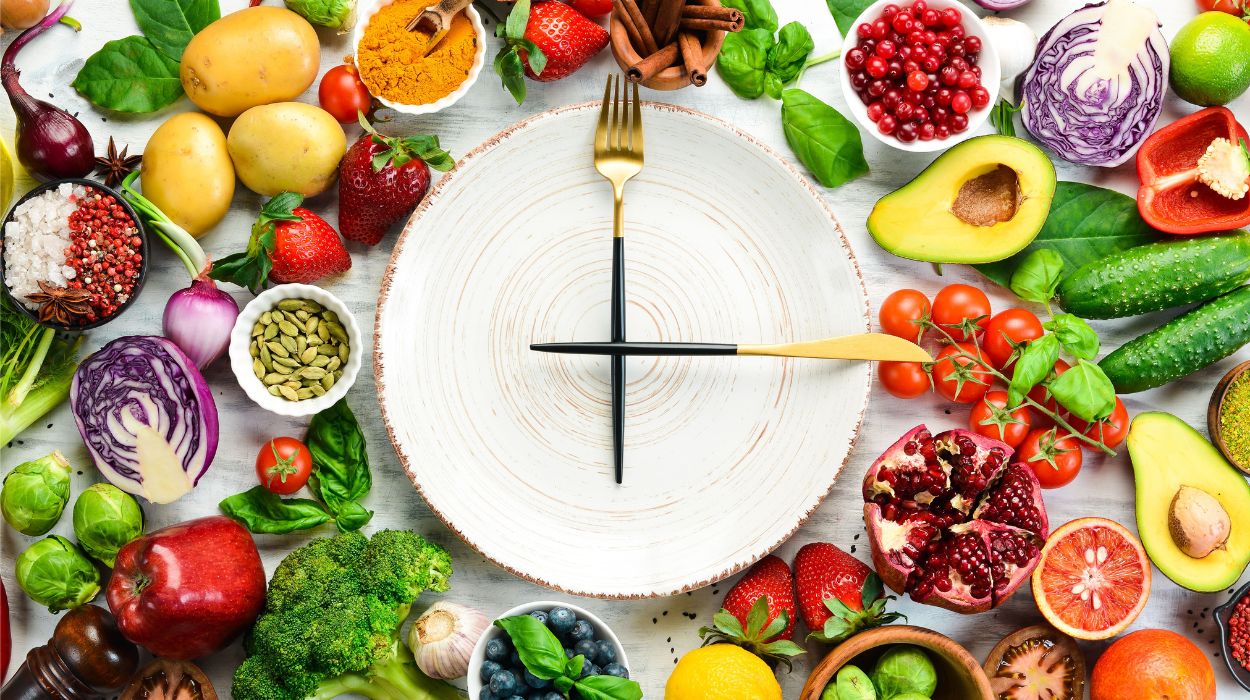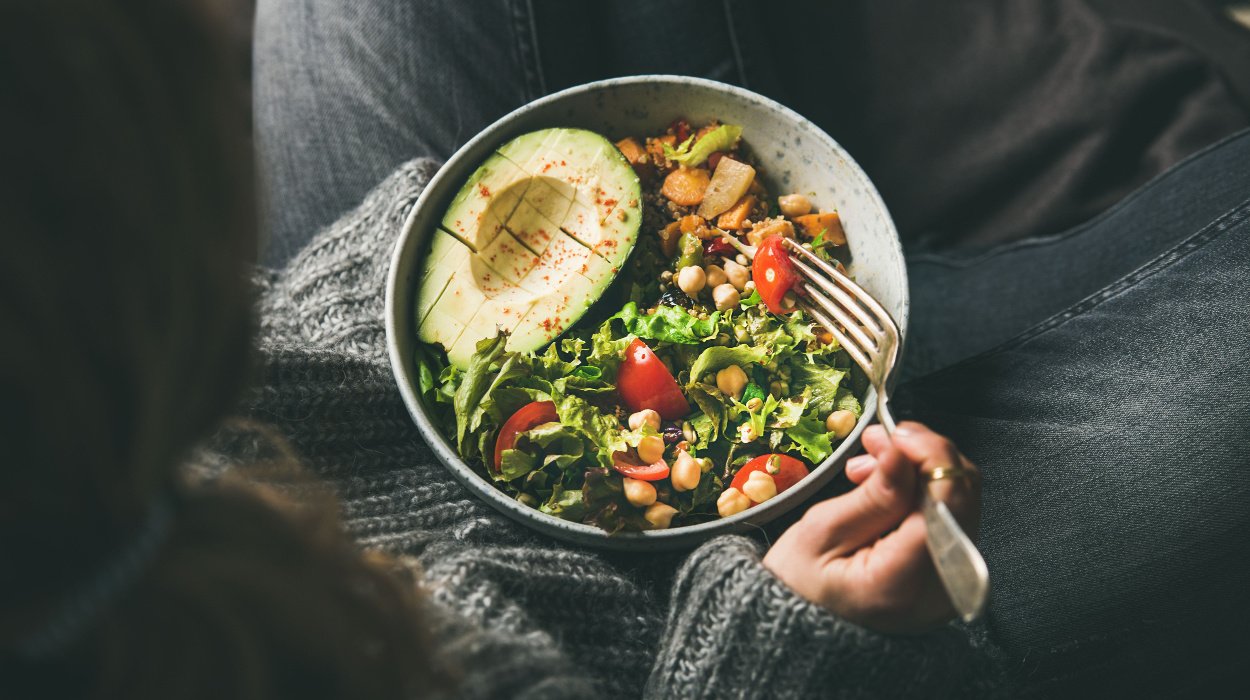What we eat plays a significant role in weight loss. However, it’s not only what we eat, but how much and how often. For weight loss, some experts advise eating smaller, more frequent meals for training athletes; others suggest sticking to two or three solid meals a day.
It can be hard to know how often to eat to lose weight. This article explains the science behind meal spacing and frequency and explains how many meals a day to lose weight is optimal for your body.
Can Eating More Often Help You Lose Weight?
Not necessarily. Evidence suggests that eating two or three regular meals a day, combined with overnight fasting and synchronizing with circadian light/dark cues, can be more effective[1] for weight loss than eating many small meals throughout the day.
However, certain individuals, such as bodybuilders, may reach their goals faster by eating smaller, more frequent meals daily.
How Many Meals A Day To Lose Weight

Research suggests that eating two or three regular meals[1] a day is most beneficial for weight loss. This may be a big change for some who prefer to eat frequent, smaller meals throughout the day.
Overnight Fasting
Eating fewer meals and extending overnight fasting is linked to lower BMI.[1] Regular fasting has additional health benefits that can support weight loss, such as reduced inflammation, improved circadian rhythm, stress resistance, efficient cellular recycling, and positive alterations to the gut microbiome.
Extending overnight fasts may require that you stop eating late at night. To support this habit, consume enough protein with all your meals. Also, consuming enough fat with your last meal of the day will increase satiety.
Meal Spacing
One study found that doubling meal frequency from three to six meals a day did not affect fat oxidation, but it did increase hunger.[2] Therefore, eating more meals, even though small, may lead to more snacking and weight gain.
Research also emphasizes the importance of regularity of meals; eating infrequently but regularly[1] causes less hunger than eating frequently but irregularly.
Let’s get more specific. You may ask, “How often should I eat to lose weight?” or “How many hours should I wait between meals?” These are good questions — the timing of meals does matter.
Some research suggests spacing out meals[3] five or six hours apart but stresses the importance of breakfast! Eating breakfast and making it the largest meal of the day can help prevent weight gain.
Breakfast
Aside from weight gain, skipping breakfast may have other health implications. Studies found that skipping breakfast increases the risk[3] of cardiovascular diseases, such as coronary heart disease,[1] by 21%-27%; eating late at night increases this risk by 55%. It also increases the risk of death[3] by 32%.
What this shows is that the best times to eat to lose weight and protect your health are in the morning, afternoon, and early evening — don’t skip breakfast,[4] and don’t eat too late.
Benefits Of Small Frequent Meals
For some, sitting down for large meals is not conducive to their lifestyle; it may be easier for them to eat smaller meals throughout the day whenever they feel hungry.
Evidence suggests that as few as two meals daily is optimal[1] for weight loss. For some, two meals a day is not enough. Multiple meals may be required, even later in the evening. Late-night snacking is not ideal for weight loss. If you have low blood sugar, experts recommend eating a snack before bed[5] to prevent overnight blood sugar drops.
While exercise is the most consistent strategy[6] for losing weight, bodybuilders are encouraged to eat three to six meals daily. This is recommended for them to get all the nutrients needed to build muscle.[7] If muscle building is your goal, more frequent, smaller meals may be preferable. In general, as you increase or change your exercise routine for weight loss, your dietary needs may shift — always listen to your body.
Who Should Not Eat Small Frequent Meals?
Choosing larger, spaced-out meals instead of small, frequent meals is not only good for weight loss, but it may also be necessary if you have certain medical conditions.
Small Intestinal Bacterial Overgrowth
For individuals with small intestinal bacterial overgrowth,[8] eating too frequently can halt healing. With SIBO, bacteria normally residing in the large intestine move into the otherwise sterile small intestine. As the bacteria ferment food there, they produce gas that can cause gastrointestinal symptoms.
The peristalsis moving intestinal contents is an electrical pattern[9] of waves in the digestive system — this is called the migrating motor complex. Bacteria and undigested food are sent downward in the digestive tract. However, it only operates during fasting periods. Putting more space between meals allows the migrating motor complex to sweep excess bacteria back into the large intestine.
Type 2 Diabetes
For individuals with type 2 diabetes, eating fewer meals every day may be advantageous. Research shows a correlation between fewer meals and less type 2 diabetes.
If you have any medical condition, ask your doctor for guidance on how many meals you should eat daily. Additionally, ask them if it would be appropriate for you to add supplements. Diet pills or fat burners may improve your weight loss regime.
Sample Meal Plan For 6 Small Meals A Day
For weight loss, knowing how many meals to eat in a day can make a significant difference in the outcome. While research mostly points to less frequent meals, this may not be right for everyone. Your unique health and medical conditions may require you to eat more meals more often.
If you’d like to eat more frequent but smaller meals daily, consider the following sample meal plan. Always prioritize healthy, whole foods, and avoid processed foods that will inhibit weight loss:
- 8 a.m. Breakfast: Vegetable omelet, sliced avocado, and whole grain toast with almond butter.
- 11 a.m. Snack: Sliced turkey with olives.
- 1 p.m. Lunch: Grilled chicken salad with olive oil-based dressing.
- 4 p.m. Snack: Sliced apple and carrot sticks with hummus.
- 7 p.m. Dinner: Baked salmon and asparagus with sweet potatoes.
- 9 p.m. Late Snack: Full-fat Greek yogurt with berries.
Conclusion
Eating two or three evenly-spaced meals a day can be most beneficial for weight loss. Spacing out meals while allowing adequate time to fast overnight can reduce weight and BMI and decrease hunger.
However, some individuals, such as bodybuilders, may need to consider the need to refuel. They might benefit from consuming more meals throughout the day with less time in between meals. Look for an eating rhythm that makes you feel good and helps you achieve your weight loss goals. If needed, enlist the help of a doctor or nutritionist to establish a suitable eating approach for you.
Frequently Asked Questions
It can be for some people. Eating two evenly-spaced meals throughout the day can support weight loss. However, if you feel hungry, you should add a third meal.
The connection between belly fat and meal frequency has not been studied extensively. However, research suggests that two or three meals daily are optimal for general weight loss.
If you want to skip one meal, avoid the late-night meal. Late-night eating can contribute to weight gain. Do not skip breakfast; studies show that skipping breakfast can harm health and weight loss.
Breakfast. Consuming a large, nutritious, and balanced breakfast can benefit weight loss. Eating a big breakfast can also help sustain energy throughout the day and set the body up for better health.
 Evidence Based
Evidence Based
